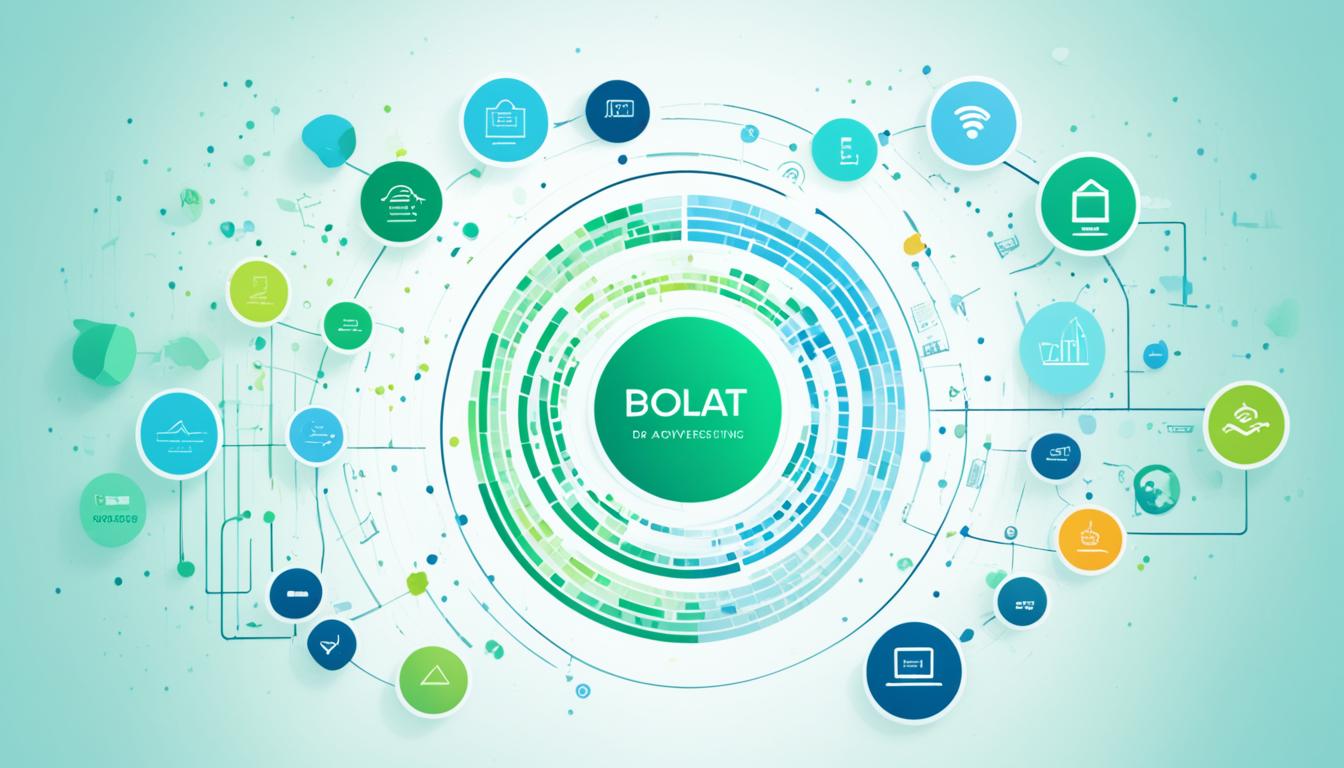Data-driven display advertising has revolutionized the way ads are targeted and optimized, thanks to the power of big data. Adtech startups are at the forefront of this advertising transformation, leveraging data analysis, automation, and optimization techniques to create personalized ad experiences that resonate with individual users.
In today’s digital advertising landscape, traditional ad methods are taking a backseat to data-driven strategies. Adtech startups collect vast amounts of data from various sources, including consumer behavior, demographics, and online interactions. This wealth of information allows them to finely tune their ad targeting and deliver highly tailored ads to specific audience segments.
By harnessing the power of big data, adtech startups can optimize ad campaigns, increase engagement, and improve return on investment (ROI). Data analysis plays a critical role in tracking key metrics, making data-driven decisions, and refining ad targeting strategies. The result? Ads that are shown to the right people at the right time, leading to more meaningful interactions and conversions.
Key Takeaways:
- Data-driven display advertising uses big data to improve ad targeting and optimize marketing campaigns.
- Adtech startups lead the way in utilizing data analysis, automation, and optimization techniques.
- Big data enables adtech startups to create personalized ad experiences that resonate with individual users.
- Data analysis is crucial for tracking key metrics, making data-driven decisions, and refining ad targeting strategies.
- Data-driven display advertising enhances engagement, conversions, and overall advertising effectiveness.
The Importance of Data in Adtech
Data plays a crucial role in the success of adtech startups. These companies collect vast amounts of data from various sources, including consumer behavior, demographics, and online interactions. By analyzing this data, adtech startups can gain valuable insights into consumer preferences and behavior, allowing them to create highly targeted advertising campaigns.
Data analysis is a key component in adtech startups’ efforts to optimize ad campaigns, track key metrics, and make data-driven decisions to improve overall campaign performance. By analyzing the data collected, adtech startups can refine their advertising strategies and deliver more relevant and personalized ads to their target audience. This targeted marketing approach leads to increased engagement and conversion rates, ultimately improving the effectiveness of advertising efforts.
“The insights gained from data analysis enable adtech startups to understand their target audience better, allowing them to create highly tailored and targeted advertising campaigns.”
Optimizing Advertising Performance
One of the main advantages of utilizing data analysis in adtech is the ability to optimize advertising performance. By analyzing consumer data, adtech startups can identify trends, preferences, and patterns that can inform their marketing strategies. This information allows them to target the right audience with the right message at the right time, maximizing the impact of their advertising campaigns.
Through data analysis, adtech startups can track key metrics such as click-through rates, conversion rates, and engagement levels. By monitoring these metrics, they can identify areas for improvement and make data-driven decisions to optimize their campaigns. This iterative process allows adtech startups to continuously refine their advertising strategies and achieve better results.
The Power of Targeted Marketing with Data
Targeted marketing is a core principle of adtech startups, and data analysis is the key driver behind it. By leveraging the data collected, adtech startups can segment their audience based on demographics, behavior, and preferences. This allows them to deliver highly personalized ads that resonate with individual users, increasing the chances of engagement and conversion.
Data analysis enables adtech startups to understand each customer’s journey and tailor their advertising message accordingly. By delivering the right message to the right person at the right time, adtech startups can provide a seamless and personalized advertising experience. This targeted marketing approach not only enhances the customer experience but also improves the return on investment for adtech startups.

The utilization of data analysis in adtech is transforming the advertising industry. Adtech startups that harness the power of data can optimize ad campaigns, increase engagement and conversion rates, and achieve a higher return on investment. Through targeted marketing with data, these startups can deliver personalized ad experiences that resonate with consumers, ultimately improving the effectiveness of their advertising efforts.
Leveraging Big Data for Targeted Advertising Campaigns
Adtech startups are unlocking the power of big data to create highly targeted advertising campaigns and enhance their display advertising strategy. By harnessing consumer data such as demographics, behavior, and preferences, these startups can deliver personalized ad content to specific audience segments.
This data-driven approach ensures that ads are shown to the most relevant people, increasing the chances of engagement and conversion. By tailoring ad content to specific audience segments, adtech startups can maximize the impact of their advertising efforts.
But how exactly do adtech startups leverage big data to improve ad targeting and optimize their display advertising strategy?
Here are a few key ways:
1. Analyzing Consumer Data
Adtech startups dive deep into consumer data to gain valuable insights into demographics, behavior, and preferences. By analyzing this data, these startups can identify patterns and trends and understand what motivates their target audience. This knowledge helps them create highly tailored ads that resonate with individual users, increasing the likelihood of engagement and conversion.
2. Tailoring Ad Content
Using the insights gained from data analysis, adtech startups can customize the content of their ads to suit different audience segments. Whether it’s adapting the messaging, visuals, or offers, tailoring the ad content ensures that it aligns with the specific interests and needs of the target audience.
3. Optimizing Campaign Performance
Big data enables adtech startups to track key metrics and make data-driven decisions to optimize campaign performance. By monitoring campaign performance in real-time, these startups can identify areas for improvement and make necessary adjustments to enhance ad targeting and overall effectiveness. This iterative optimization process ensures that adtech startups are constantly refining their strategies to deliver better results.
4. Enhancing the Customer Experience
Personalized ads, fueled by big data insights, provide a better customer experience. By delivering relevant and tailored ad content to users, adtech startups create more meaningful interactions between brands and consumers. This personalized approach enhances engagement, builds trust, and increases the chances of conversion.
To put it simply, leveraging big data in targeted advertising campaigns allows adtech startups to refine their ad targeting strategies, enhance the customer experience, and improve return on investment (ROI).
With access to vast amounts of data and sophisticated data analysis techniques, adtech startups are at the forefront of driving innovation in display advertising. By continuously optimizing and refining their strategies based on data-driven insights, these startups are able to stay ahead of the curve in the ever-evolving advertising landscape.

Real-Time Bidding and Ad Buying Process
Real-time bidding is revolutionizing the ad buying process in adtech startups. Through programmatic advertising, these startups automate the buying and selling of ad inventory in real-time, eliminating the need for manual negotiations.
By utilizing real-time bidding, adtech startups can optimize ad placement based on user data and bid on ad spaces that align with specific targeting criteria. This data-driven approach ensures that ads are displayed to the most relevant audience, increasing the chances of engagement and conversion.
Let’s take a closer look at how the real-time bidding process enhances the efficiency and effectiveness of the ad buying process, making it more streamlined and data-driven:
- Adtech startups utilize data analysis and algorithms to determine the optimal ad placement and targeting criteria.
- Based on this analysis, adtech startups participate in real-time bidding auctions to compete for ad inventory.
- During these auctions, adtech startups use algorithms to dynamically bid on ad spaces, considering factors such as user data, targeting criteria, and budget constraints.
- The highest bidder wins the auction and their ad is displayed to the target audience.
- This real-time bidding process allows adtech startups to maximize the effectiveness of their ad campaigns by reaching the right audience at the right time.
Real-time bidding not only streamlines the ad buying process but also provides adtech startups with valuable insights into user behavior and preferences. These insights can be further leveraged to refine targeting strategies and improve overall campaign performance.
“Real-time bidding has transformed our ad buying process. It allows us to make data-driven decisions and ensure that our ads are displayed to the most relevant audience, resulting in higher engagement and conversion rates.”
– Sarah Johnson, CEO of AdTech Solutions

| Advantages of Real-Time Bidding | Challenges of Real-Time Bidding |
|---|---|
| 1. Increased targeting precision | 1. Ad fraud and invalid traffic |
| 2. Enhanced campaign efficiency | 2. Brand safety concerns |
| 3. Real-time optimization | 3. Privacy and data protection |
| 4. Improved ROI | 4. High competition and bidding costs |
Harnessing Artificial Intelligence for Personalized Advertising
Artificial intelligence (AI) is revolutionizing personalized advertising, enabling adtech startups to deliver highly targeted ad experiences to individual users. By leveraging AI algorithms, these startups can analyze vast amounts of data to understand consumer behavior and preferences, creating tailored ad content that resonates with their target audience.
AI-powered personalization algorithms analyze user data in real-time, allowing for dynamic content optimization and ad delivery. This means that adtech startups can deliver relevant and personalized ads at scale, enhancing the overall user experience and increasing the chances of engagement and conversion.
“AI-powered algorithms enable adtech startups to turn data into actionable insights, allowing for more effective advertising strategies.”
With AI’s ability to process large volumes of data quickly and accurately, adtech startups can fine-tune their targeting strategies and deliver ads that are more likely to resonate with their audience. This data-driven approach not only maximizes the impact of advertising campaigns but also boosts return on investment (ROI) for advertisers.
Benefits of AI in Personalized Advertising
- Enhanced targeting: AI algorithms enable adtech startups to segment their audience and deliver customized ad experiences based on user preferences and behavior.
- Improved engagement: Personalized ads created with the help of AI are more likely to capture the attention of users, leading to higher engagement rates.
- Increased conversions: By delivering tailored ads to users who are most likely to be interested in their products or services, adtech startups can drive higher conversion rates.
- Optimized ad placement: AI algorithms can analyze real-time data to identify and bid on ad spaces that align with specific targeting criteria, ensuring ads are displayed to the most relevant audience.
Example Use Case: AI-Powered Personalization
Let’s consider an example of an e-commerce adtech startup that uses AI-powered personalization to deliver personalized product recommendations to its users. The startup collects user data such as browsing history, purchase behavior, and demographic information.
Using AI algorithms, the startup analyzes this data to understand each user’s preferences, interests, and buying patterns. Based on these insights, the startup then delivers targeted product recommendations that are likely to appeal to individual users.
The AI-powered personalization algorithms continually learn and adapt based on user interactions, allowing the startup to refine its ad targeting and deliver increasingly relevant recommendations over time.

By harnessing the power of AI, this adtech startup can deliver personalized ads that drive engagement and conversions, ultimately improving the effectiveness of their advertising efforts.
Conclusion
Data-driven display advertising is revolutionizing the advertising industry, with adtech startups at the forefront of harnessing the power of big data. By leveraging data analysis, automation, and optimization techniques, these startups are able to deliver targeted and personalized ads to consumers, significantly improving ad targeting and overall advertising effectiveness.
The use of big data enables adtech startups to optimize campaign performance, increase engagement and conversions, and achieve a higher return on investment (ROI). As a result, success stories of data-driven ad campaigns abound, showcasing the transformative impact of utilizing data to deliver precise and impactful advertising experiences.
However, the evolving landscape of adtech also presents its fair share of challenges and opportunities. Adtech startups must navigate a competitive market, addressing concerns related to data privacy and ethical considerations. Adhering to best practices in data handling and ensuring transparency in data usage will be essential for the continued success of adtech startups.
Looking ahead, the future of adtech is promising, driven by continuous innovations and advancements in data-driven advertising techniques. The ability to leverage big data, combined with emerging technologies such as artificial intelligence and machine learning, will shape the future of adtech. By constantly adapting to changing consumer behaviors and preferences, adtech startups have the opportunity to unlock new possibilities and deliver even more targeted and personalized ad experiences to users.
FAQ
What is data-driven display advertising?
Data-driven display advertising is a strategy that utilizes big data to improve ad targeting and optimize marketing campaigns. It involves leveraging data analysis, automation, and optimization techniques to create highly tailored ad experiences that resonate with individual users.
How does data analysis contribute to ad targeting?
Data analysis plays a crucial role in ad targeting by providing valuable insights into consumer preferences and behavior. By analyzing data such as demographics, behavior, and preferences, adtech startups can create targeted advertising campaigns that increase engagement and conversion rates.
What is real-time bidding and its role in ad buying?
Real-time bidding is a process in which adtech startups automate the buying and selling of ad inventory in real-time. This allows them to optimize ad placement by using data analysis and algorithms to bid on ad spaces that align with specific targeting criteria, ensuring ads are displayed to the most relevant audience.
How does artificial intelligence (AI) contribute to personalized advertising?
Artificial intelligence (AI) algorithms analyze vast amounts of data to understand consumer behavior and preferences. By leveraging AI, adtech startups can create highly tailored ad content that resonates with individual users, leading to increased engagement and conversion rates.
Why is data-driven display advertising important for adtech startups?
Data-driven display advertising allows adtech startups to optimize ad campaigns, increase engagement and conversions, and achieve a higher return on investment (ROI). By leveraging data analysis, automation, and optimization techniques, adtech startups can improve ad targeting and overall advertising effectiveness.








